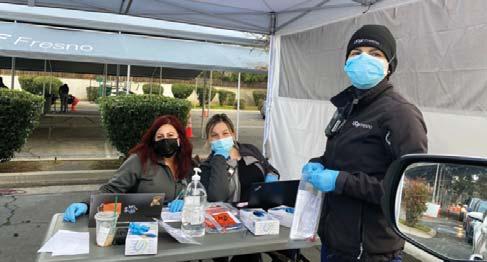
26 minute read
Local, State and Global Community
Local Community
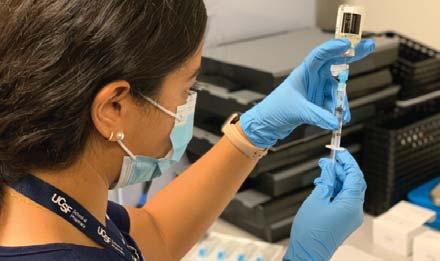
Advertisement
By Barbara Anderson, UCSF Fresno Communications
The UCSF Fresno Mobile HeaL COVID-19 Equity Project (CEP) has become the largest drive-thru, free clinic for testing, vaccine administration and treatment of SARS-CoV2, serving the most vulnerable and underserved populations in Fresno County.
And through partnerships with community-based organizations, UCSF Fresno Mobile HeaL has held hundreds of mobile testing, vaccine, therapy and treatment events in neighborhoods throughout the city and county.
From August 2020 through June 30, 2022, CEP gave more than 88,000 COVID-19 tests, nearly 75,000 vaccines were administered and nearly 600 people received monoclonal antibody therapy and anti-viral prevention treatment for the coronavirus. About 80% of people receiving services at CEP identified as people of color.
Since August 2020, when the City of Fresno approached UCSF Fresno and community-based organizations to provide free COVID-19 tests, outreach, contact tracing and social support and provided $5 million in CARES Act funds – and ultimately with Fresno County providing additional funding for vaccines, therapy and treatment – UCSF Fresno Mobile HeaL CEP became a vital partner and leader in the pandemic fight.
As pandemic circumstances evolved, UCSF Fresno quickly expanded CEP services to meet new needs for prevention and therapy. Beginning in February 2022, CEP began providing free, accessible monoclonal antibody therapy for adolescents and adults with moderate to severe compromised immune systems and for those who had an allergic response to COVID-19 vaccine. Evusheld, a longacting antibody combination for pre-exposure prevention of COVID-19, helps people with weakened immune systems mount a strong immune response to the coronavirus. Fresno County estimates that 30,000 residents could benefit from the therapy.
In May 2022, CEP began administering the oral antiviral medication, Paxlovid, used to treat mild-to-moderate COVID-19 in adults and pediatric patients 12 years of age and older who are at high risk for progression to severe COVID-19, including hospitalization or death. UCSF Fresno purposely created a free, no insurance, no-appointment model for testing and vaccine to eliminate barriers to health access experienced most often by people of color, such as transportation constraints, limited English proficiency, and limited technological literacy or no computer access. “We really did not want to do an appointment system because it really didn’t fit the mission to serve the underserved and vulnerable population,” said Kenny Banh, MD, assistant dean of undergraduate medical education and CEP medical director.
UCSF Fresno, a regional campus of the UCSF School of Medicine, was uniquely positioned to quickly begin COVID-19 testing and vaccine injections. In 2018, Dr. Banh started a mobile health service for the central San Joaquin Valley. UCSF Fresno’s Mobile Health and Learning (HeaL) provides flu shots and health screenings for patients while providing learning opportunities for medical students and pre-health students under the guidance of medical residents and faculty physicians. In addition to training physicians and teaching medical students and providing clinical and volunteer experiences for pre-health students, UCSF Fresno is committed to improving the health of the San Joaquin Valley, and Mobile HeaL and now CEP, are means of providing needed care outside of hospital and clinic walls, said UCSF Fresno Associate Dean Michael W. Peterson, MD, FCCP, MACP.
The UCSF Fresno Mobile HeaL (CEP) has also become a valued training ground for future health professionals. UCSF Fresno’s mission is to provide high-quality health care but also to train the next generation of physicians for the San Joaquin Valley. CEP consciously hires diverse people from the Valley who are representative of the patients being served. The staff of vaccine support specialists understand the people who are being served and communicate to and provide care in a culturally appropriate manner.
UCSF Fresno Mobile HeaL CEP Becomes Largest Drive-Thru Free COVID-19 Clinic, Expands Services to Include Antibody Therapy, Anti-Viral Treatment
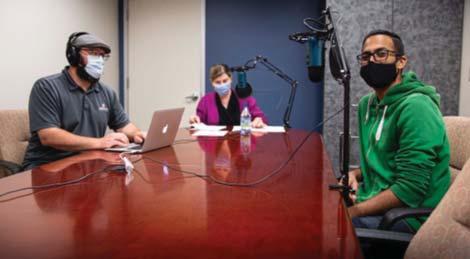
UCSF Fresno and American Ambulance Partner for Award-Winning Educational Emergency Medical Services Podcast
By Barbara Anderson, UCSF Fresno Communications
A unique podcast for paramedics and EMTS (emergency medical technicians) produced by American Ambulance and hosted by UCSF Fresno Emergency Medicine physicians has won statewide acclaim and drawn listeners from as far away as Alaska and Australia.
The American Ambulance EMS podcast received the California Ambulance Association Services Excellence (CAASE) Award for Innovation in EMS in 2021, and an episode about amputations ranked among the Top 12 podcasts in 2021.
The Innovation Award recognized the unique partnership between American Ambulance and UCSF Fresno physicians Danielle Campagne, MD, FACEP, vice chair of Emergency Medicine at UCSF Fresno, UCSF associate professor of Emergency Medicine and American Ambulance medical director; Patil Armenian, UCSF associate professor of Emergency Medicine and co-director of Toxicology at UCSF Fresno; and Saajan Bhakta, DO, UCSF Fresno fourth-year Emergency Medicine resident. “I listen to a lot of EMS (Emergency Medical Services) podcasts and sometimes they include the medical director, but I have not found one with three physicians dedicated to each and every podcast,” said Steve Melander, chief operations officer at American Ambulance.
The podcast has been well received, Melander said. “What makes it so good is you have those three physicians with various backgrounds and experiences.”
Melander got the idea of starting an EMS podcast two years ago. He had been looking for a new way for EMS field staff to receive educational information. He pitched the idea of a podcast to Dr. Campagne, who initially hesitated. “I am not a techy,” she explained. But she mentioned the concept to her colleague, Dr. Armenian. “I love podcasts and I listen to podcasts all of the time,” Dr. Armenian said. “I told Dr. Campagne, ‘we’re doing the podcast and I’m doing it with you.’” The professors brought aboard Dr. Bhakta, who has an interest in pre-hospital and disaster medicine – and who is an avid podcast listener. Melander tapped John-Mark Bergen, multi-media arts specialist at American Ambulance, to produce the podcast.
The first episode of American Ambulance EMS aired in April 2020 – a month after the World Health Organization proclaimed COVID-19 a pandemic. “It was perfect timing for what we needed for EMS education locally and nationally,” said Dr. Campagne. “We can’t get people in a room together and it is difficult to coordinate schedules to do EMS education on Zoom.” Field staff can listen to episodes on shifts while driving or at times of their convenience. Episodes are recorded in the ambulance company’s conference room, which has space for the physicians to maintain social distance. “The mics are spread out as far as they can and still be plugged into my computer,” Bergen said. “And we’re all masked up,” said Dr. Armenian.
The physicians had recorded 60 episodes as of December 2021. They record up to three episodes at one sitting and take turns as content director. Research is done for each topic and an outline of the contents is created prior to the recording. The preparation allows for a conversation among themselves and with a guest instead of giving a lecture about the evidence-based research and practices. Dr. Campagne is comfortable with the format. “It’s not recorded live – we can make edits – and John-Mark makes us sound good. “It’s turned out to be very fun,” she said.
Podcast topics have ranged from anaphylaxis (a severe, life-threatening allergic reaction) to dental emergencies, stroke and hypothermic cardiac arrest. They also have included a discussion about PTSD (Post Traumatic Stress Disorder). “Some of the episodes are very medical, such as how to stop bleeding, but some episodes look at the super-fast decision making and innerworkings of an EMS system,” Dr. Armenian said.
American Ambulance paramedics are often guests on the podcast. “We like to highlight the unsung heroes,” Dr. Campagne said. EMS field staff provide a lot of the experience in the community, Dr. Bhakta said. “We have episodes where we interview the most experienced medics
out there. And they have been great sources for ideas and topics and experiences to talk about.”
Bergen looks forward to recording Drs. Campagne, Armenian and Bhakta. “It’s an awesome group,”’ and the topics are interesting. “It has been really eye-opening for me. You can think that you’re not a doctor or a paramedic and that there is ‘nothing for me here,’ but I actually understand and appreciate the podcast and I learn something every time. It’s accessible,” he said.
“American Ambulance has a desire not only to provide valuable information to our employees who serve our community, but to anyone working in EMS and emergency medicine,” said Erik S. Peterson, Esq., general manager at American Ambulance. The dedication of Dr. Campagne and the other doctors and her guests has been inspiring. Certainly, some of our content is considered in the context of our local policies, but they have covered many topics that even the general public may benefit from. We are grateful. It has been an exciting program and we are excited we can offer it.”
Dr. Armenian appreciates the commitment that American Ambulance has shown the podcast team. “They are supportive of our creativity,” she said. And Dr. Bhakta said, “it’s a great collaboration and I’m excited to be doing it.” Dr. Campagne has been medical director at American Ambulance for the past 2 ½ years and said UCSF Fresno values its relationship with American Ambulance. “We are a unique collaborative partnership,” she said.
By Barbara Anderson, UCSF Fresno Communications
The VA Central California Health Care System, an affiliated partner of UCSF Fresno, recently became the first institution in Central California to receive a Geriatric Emergency Department (GED) accreditation.
“We sought the accreditation to improve patient outcomes, provide standardized approaches to care that basically address very common complaints for patients who are geriatric in age,” said Manavjeet S. Sidhu, MD, MBA, a UCSF Fresno emergency physician, and the Emergency Department (ED) director at the VA.
GED accreditation by the American College of Emergency Physicians (ACEP) also “ensures that there is optimal transition of care from the ER to other areas, such as the inpatient setting, the home or community-based care, which a lot of our veterans use,” Dr. Sidhu said.
Geriatric patients in the VA’s Emergency Department are assured of ready access to wheelchairs, walkers and other ability aids and transportation to either their homes or other care facilities, for example, Dr. Sidhu said. “We have essentially worked on ways so there is less of a burden for not just the veteran, but the veteran’s family members.”
“Preparing for accreditation allows the hospital and ED to focus on the needs of this complex and growing population and to ensure that the resources available to the ED meet the needs of the patients they serve, said Nicole Tidwell, Geriatric Emergency Department Accreditation program director at ACEP. “Early data from existing models of geriatric emergency care – models that promote best clinical practices and create a more positive and sensitive physical environment – show they have the potential to improve
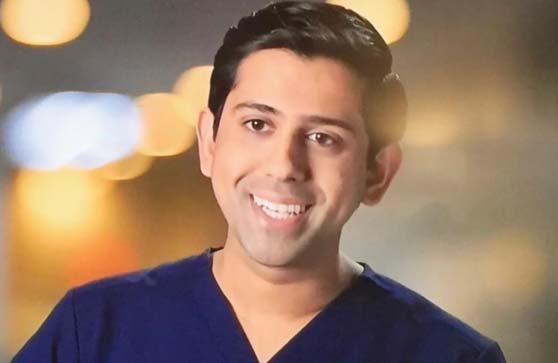
UCSF Fresno and VA Central California Health Care System Partnership Invaluable in Achieving Emergency Department Geriatric Accreditation
health outcomes, coordinate care more effectively, and reduce costs. In sum, GED accreditation signals to the public that accredited institutions are focused on the highest standards of care for their community’s older adults. Standards of care that can make Grandma and Grandpa rest easy knowing they are in good hands,” she said.
In addition to providing veterans with optimal care, the GED accreditation at the VA in Fresno provides opportunities for residents at UCSF Fresno to learn the delivery of excellent geriatric patient care. As a regional graduate and undergraduate medical education campus of the UCSF School of Medicine, UCSF Fresno conducts its training and patient care through a network of affiliated partners. Medical students, residents and fellows work and train in a variety of training sites and the VA Central California Health Care System is a valued training facility.
“At the VA, one of our pillars is medical education,” Dr. Sidhu said. UCSF Fresno interns, (first-year residents in Internal Medicine), rotate for two weeks at the VA Emergency Department. In their second and third year of training, residents admit patients to the VA hospital under supervision of attending faculty physicians. UCSF Fresno fellows, who are in advanced training in cardiology, gastroenterology, among other specialties, are on call to see patients in the hospital.
“Fellows, as well as residents are able to learn from our patient population, and vice versa, our patient population is really able to take away a lot from our residents and fellows,” Dr. Sidhu said.
Achieving GED accreditation became one of Dr. Sidhu’s first projects in August 2020, when he accepted the position of director of the Emergency Department at the VA. Dr. Sidhu is an alumnus of the Emergency Medicine Residency Program at UCSF Fresno, where he was chief resident.
Dr. Sidhu was instrumental in the VA’s successful application for GED accreditation, said Will McCullough, public affairs officer at the VA Central California Health Care System. “He has been a wonderful addition to our facility, our health care system. And we’re very happy to have him aboard,” McCullough said.
The accreditation process involved physicians, nurse champions, and people in many other areas of the hospital, Dr. Sidhu said. “It was a huge team effort.”
The VA Central California Health Care System is very proud of Dr. Sidhu and the entire Emergency Department team and what they have been able to accomplish in a very short period, McCullough said. “The designation is a milestone, when you consider there are only about 300 health care systems across the country which have achieved this particular status,” he said.
“Accreditation signals to our community that our institution focuses on a high standard of care for our communities’ older adults,” Dr. Sidhu said. “Fortunately, UCSF Fresno Internal Medicine residents have the opportunity to rotate with our ED providers and work in an ED that meets the interdisciplinary geriatric standards set forth by the American College of Emergency Physicians.” UCSF Fresno Creates Office to Enhance Coordination and Success of Regional Campus’ Pathway Programs
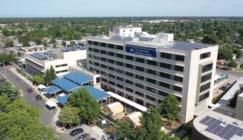
UCSF Fresno Named One of Four Regional Hubs in California to Build Pathway for Community College Students to the Medical Field
In June 2022, the California Medicine Scholars Program (CMSP) launched as part of a statewide strategy and investment by the Department of Health Care Access and Information to strengthen the California community college to medical school pathway. As its first established action, CMSP, housed at the Foundation for California Community Colleges, awarded funds to four recipients to establish Regional Hubs of Healthcare Opportunity (RHHOs), which will bridge gaps between community colleges, four-year universities, medical schools, and community-based health clinics and organizations to provide greater pre-medical opportunities for students and help diversify California’s primary care physician workforce.
The four awards were made to: • UCSF Fresno, a regional campus of the UCSF
School of Medicine • UC Davis School of Medicine • UC Riverside School of Medicine, and • UC San Diego School of Medicine
All hubs reside in regions underserved in health care and are currently experiencing a physician shortage. Each grantee will receive $1.6 million for the first three years ($540,000 annually) with additional funding ($250,000) available in the fourth year for sustainability. Funding will support the creation of RHHOs and provide a strategy to increase the number of underrepresented minority physicians and ultimately reduce disparities in health and health outcomes across the state.
UCSF Fresno is the lead agency for the San Joaquin Valley Regional Hub of Healthcare Opportunity (SJV-RHHO). The SJV-RHHO, which launched July 1, 2022, creates the first pre-medical diversity pathway from community college to primary care physician program in the San Joaquin Valley known as the California Medicine Scholars Program (SJV-CMSP).

“The vision of the SJV-CMSP is to increase the numbers of underrepresented minority physicians through a collaborative partnership effort. This program fulfills a need in the pathway to practicing physician at the community college level,” said Kenny Banh, MD, assistant dean for Undergraduate Medical Education at UCSF Fresno. “The mission specifically is to increase the number of regional community college students who transfer to and are accepted into medical schools from California State University, Fresno.”
In addition to UCSF Fresno, SJV-CMSP partners include: • California Health Sciences University • Fresno State • State Center Community College District (Fresno City
College, Clovis Community College, Madera/Oakhurst
Community College, Reedley Community College) • College of the Sequoias (Hanford, Tulare and Visalia campuses) • Merced Community College District (Merced and Los
Banos campuses) • West Hills Community College District (Coalinga, Firebaugh and Lemoore campuses) • Yosemite Community College District (Columbia College and Modesto Junior College) • California Area Health Education Center Program • Central Valley Health Network, and • Valley Health Team Family Residency Medicine Program.
Students applying to the SJV-CMSP must be on track to complete at least 22 credits at their community college, plan on applying to Fresno State the following academic year, come from an economically or educationally disadvantaged background; have an overall GPA of 3.30 or higher (transcripts must be submitted); provide a personal statement and letter of recommendation as well as take part in a personal interview and demonstrate a commitment to participate in SJV-CMSP activities to pursue a career as a physician. academic support through advising from the identified pre-health college advisors at all partner colleges, starting with the community college and then transitioning to advising by Fresno State faculty as well as other enrichment opportunities such as conferences, academic skills workshops, medical school application workshops, mentoring and clinical experiences with a special focus on facilitating student matriculation and preparedness for medical school.
UCSF Fresno already implements several programs aimed at inspiring, informing, and academically preparing students, especially those from underrepresented backgrounds for careers in health and medicine. These include the highly successful Doctors Academy programs at Caruthers and Sunnyside high schools in Caruthers Unified School District and Fresno Unified School District respectively; the Summer Biomedical Internship Program; Mini-Medical School and Reaching Out to Aspiring Doctors for the San Joaquin Valley among other programs.
“Developing a high-quality undergraduate medical education program and the foundation for a future medical school requires that enough qualified students from the region are available to be recruited to the program,” said Michael W. Peterson, MD, associate dean for Undergraduate Medical Education and Research at UCSF Fresno. “Improving efficiencies and developing financial sustainability of pathway programs are essential to continue the tremendous momentum and success we have accomplished to date with programs like the Doctors Academy built by our very own Katherine A. Flores, MD, and to expand to serve community college students with the SJV-CMSP.”
To better coordinate and increase the success of existing pathway programs, SJV-CMSP and future programs, Associate Dean Peterson and Assistant Dean Banh announced that UCSF Fresno is creating an Office of Health Career Pathways within the Department of Undergraduate Medical Education. Emy Lopez Phillips, EdD, has been appointed as the inaugural Director. Dr. Lopez Phillips will oversee the SJV-CMSP and provide administrative oversight to all UCSF Fresno pathway programs. Her responsibilities will include budget development, fiscal management, coordination of student volunteer experiences, representing UCSF Fresno to community-based organizations and educational institutions and districts to support health and medical educational career opportunities for students.
“I am honored to build upon the success of existing programs and launch new ones like the San Joaquin Valley California Medicine Scholars Program that will expand access to careers in health and medicine for community college students,” said Dr. Lopez Phillips. “The young people in our Valley are full of hope and resilience. Many have a strong desire to give back to their communities and break the cycle of poverty within their families. This is an exciting time as we at UCSF Fresno along with our partners have an opportunity to help lift and mentor the next generation.”
State Community
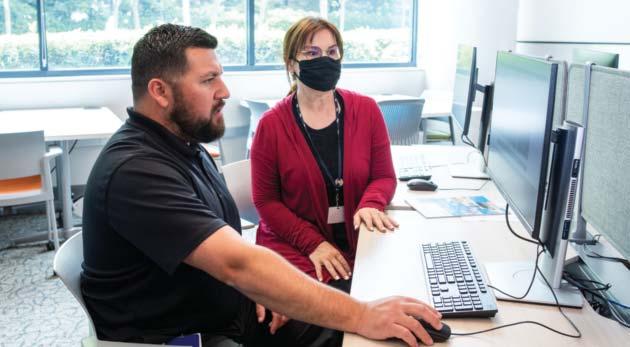
UCSF Fresno Celebrates 50th Anniversary of California AHEC Program to Improve Access to Quality Health Care Through Community Partnerships
By Barbara Anderson, UCSF Fresno Communications
The California Statewide Area Health Education Center (AHEC) Program, housed and administered at the UCSF Fresno Department of Family and Community Medicine, is celebrating 50 years of recruitment, training, and retention of health professionals for under resourced communities.
California AHEC was established in 1972 as part of the National AHEC Program developed by Congress. The AHEC mission in California is to improve access to quality health care for underserved populations in urban and rural communities through academic and community partnerships. Health care workforce development is crucial in California, especially in the San Joaquin Valley, which has the second-lowest rate of primary care physicians per 100,000 population in the state.
California AHEC receives federal funding through state initiatives and from the Bureau of Health Workforce under the Health Resources and Services Administration (HRSA). UCSF Fresno administers the funding and subcontracts with a network of 12 AHEC centers, serving 58 counties, located in under resourced areas of the state to provide population-based education and training for students and health professionals. Each center, in collaboration with their regional advisory boards develops programs to respond to specific health care workforce needs of the community. The AHEC centers conduct their programs through many educational, clinical and community partnerships.
“California is a large, diverse state with health care workforce shortages and challenges that are as varied as the state’s geography. Addressing disparate workforce needs requires a collaborative spirit that AHEC has engendered to achieve,” said Ivan Gomez, MD, program director and principal investigator of AHEC, and Chief of the UCSF Fresno Department of Family and Community Medicine. “Statewide, each AHEC center has developed activities that respond to individual community health workforce priorities and opportunities, all the while engaging with each other to share ideas and best practices. We, at the AHEC Program Office at UCSF Fresno, are proud to help facilitate our partners in their efforts to improve access to quality and culturally competent health care to people in under resourced regions of the state.”
In the past three fiscal years (2018-21), California AHEC has provided professional education and support to 16,318 participants; health careers promotion and preparation to 15,893; and 1,922 in rotations, clerkships, internships and community experiences.
The AHEC Program Office coordinates the implementation of our program objectives through our 12 centers. The program office provides technical assistance, webinar development, and promotes collaboration with our state partners. “We collaborate with our AHEC centers to provide the training and education that are needed in our regions,” said JD Garza, AHEC Associate Program Director.
For example, the Central Coast AHEC, housed at the non-profit Health Projects Center (HPC) in Santa Cruz, California, focuses on increasing the number of health professionals trained to care for the state’s rapidly growing geriatric population. “Our nonprofit is dedicated to keeping older adults and people with disabilities safe at home,” said John Beleutz, MPH, Central Coast AHEC Director. Central Coast AHEC trains Family Medicine residents from Natividad Medical Center in Salinas, California, and nursing students
from Cabrillo College in Aptos, California, through clinical and community rotations, teaching and simulations. Health professionals from area community health centers also receive continuing education in chronic disease care and geriatrics. “Our biggest pipeline for new social workers at the Health Projects Center is our internship program that is in part supported by AHEC to allow us to give those folks experience. Many of them are bilingual, bicultural, from diverse backgrounds, and we’re retaining them,” Beleutz said.
The Central Valley AHEC, hosted by the Central Valley Health Network (CVHN), is focused on collaborative workforce development activities to address member health centers’ needs in the areas of recruitment, retention and on-going staff development. CVHN is comprised of 14 Federally Qualified Health Centers (FQHCs), which serve 21 counties in California. FQHCs serve people of all ages, races and ethnicities and people without insurance.
“Workforce development has long been one of our primary strategic initiatives,” said CVHN Chief Operation Officer and Central Valley AHEC Director Mary Renner.
All 12 AHEC centers in California participate in the AHEC Scholars Program in Community Health, which launched in 2018 for high-potential health professions students in the health professions to experience primary care with an emphasis on community health and interdisciplinary practice in medically under resourced communities. “We have grown AHEC Scholars over the last three years. We have been able to enroll over 530 students to date,” Garza said.
UCSF San Joaquin Valley Program in Medical Education (SJV PRIME) participates in the AHEC Scholars Program, serving as mentors and role models for youths in the Central Valley. SJV PRIME is a tailored track at UCSF for medical students who are committed to ensuring high quality, diverse and well distributed medical care to improve the health of communities and individuals in the San Joaquin Valley.
Amitoj Singh, an SJV PRIME student from Fresno, said participating in the AHEC Scholars Program allowed him to gain additional knowledge and experience in underserved settings. “During my involvement, I was able to educate community members in the Central Valley about chronic health issues like diabetes, engage in research on the relationship between COVID-19 and asthma, and create mental health resources that were distributed at Camarena Health (a Maderabased Community Health Center) Fairs. To all health professional students who are interested in working with marginalized communities, I highly recommend participating in this program.”
The AHEC Scholars Program has been successful for the South Bay AHEC said Jesse Tarango, South Bay AHEC Director. The South Bay AHEC is hosted by the Community Health Partnership (CHP), a community clinic consortium of 10 community health centers with 41 sites serving Santa Clara and San Mateo counties. AHEC Scholars are placed in the health centers and three graduates of the AHEC Scholars Program were hired by health centers this past year. “We’re getting great feedback from the CEOs,” Tarango said.
The Central Valley AHEC has expanded its AHEC Scholars Program to include high school students. “Even though initially the idea of AHEC Scholars was for medical students, as the program evolved across the country, people realized it really needed to be broader than that,” Renner said. “We have a couple of high schools that we work with in Madera around certified nursing assistant programs, and a high school in the Sacramento area, we work with on its community health worker program.”
“The California AHEC has five partners that provide the latest information about health professional workforce development and share information about available resources with AHEC centers,” Garza said.
The partners are California Primary Care Association; California State Office of Rural Health; California Department of Health Care Access and Information (HCAI); California Community Colleges – Workforce & Economic Development Division; California State University Office of the Chancellor.
“For example, through its partnership with the California State Office of Rural Health, California AHEC has received a five-year grant for workforce resiliency. As a result, AHEC centers across the state will be able to provide services to address burnout among health profession students and health professionals. Burnout is a primary factor in health professionals leaving their field and we want to mitigate that by providing resources with the goal of having them stay on board with the community health center consortia they are working with,” Garza said.
“The California AHEC is grateful for its partners and the network of centers,” Garza said. “Through collaboration we are achieving the goal of recruiting, training and retaining health professionals. And that is the overarching mission of the California AHEC.”
New Director of Global Health at UCSF Fresno Encouraging Residents, Faculty to Pursue Global Health Projects
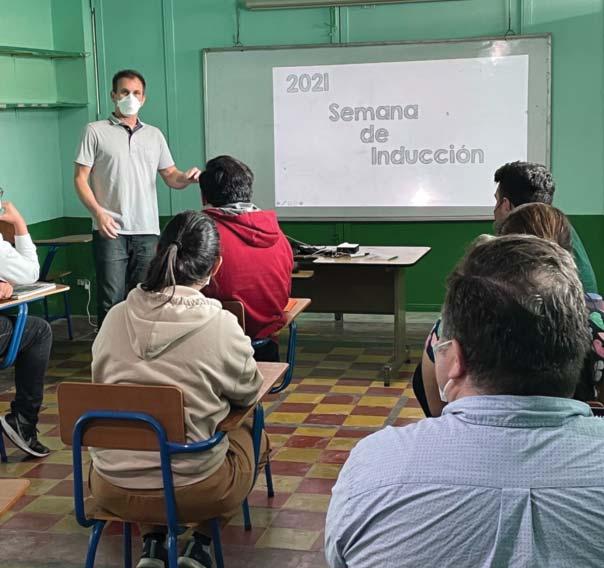
By Barbara Anderson, UCSF Fresno Communications
Improving health and reducing the burden of disease in vulnerable populations worldwide is a commitment of the UCSF School of Medicine, and as a regional campus, UCSF Fresno embraces that mission, especially as the San Joaquin Valley’s diverse population provides a window into how interconnected we are globally.
“People do not live in a microbiologic or socioeconomic world that can be clearly delineated by national borders. A virus that originates in China can impact the entire world. Community violence in Central America impacts the patients we see here in Fresno,” said Ryan Ernst, MD, the new director for Global Health Education at UCSF Fresno.
Global health education has been available at UCSF Fresno for more than a dozen years or so. A Global Health sub-committee meets regularly, however, this past year COVID-19 restrictions severely limited international and regional travel for global health activities. UCSF Fresno pivoted and continued with many educational projects online that Dr. Ernst initiated in the UCSF Fresno Department of Emergency Medicine where he is an assistant clinical professor. Dr. Ernst became Director of Global Health in July 2021, succeeding Emergency Medicine physician Rais Vohra, MD, who in addition to being a faculty member at UCSF Fresno is serving as interim Fresno County public health officer.
Increasing participation in global health activities at UCSF Fresno is a goal of Dr. Ernst’s, and an informational dinner for faculty and residents was held in June 2022. He is hoping to encourage more residents to pursue global health projects, such as fourth-year Emergency Medicine (EM) resident, Brandon Kuang, MD, who developed an Area of Concentration (AOC) in global EM education. Dr. Kuang gave virtual lectures to physician colleagues in Nairobi, Kenya, and Ho Chi Minh City, Vietnam, Dr. Ernst says. Dr. Kuang also enrolled to attend the Consortium of Universities for Global Health virtual global health conference this year.
No travel funds could be used for residents or for Dr. Ernst, but he traveled independently for projects he was working on that required ongoing support and education. “I can’t allow these projects to be unreliable or inconsistent – establishing reliable longitudinal relationships is imperative in this work,” he said. In March 2022, he traveled to Ho Chi Minh City, Vietnam. “I’ve been working with hospital/physician colleagues there since 2015, in a multi-university collaboration. In November 2019, we gained acceptance from the Ministry of Health to implement an 18-month Emergency Medicine diploma program. This is the first formal training in Emergency Medicine in the south of the country and is centered in the large trauma hospital in Cho Ray, in the heart of the Cholon district.” The first three physicians graduated in early April 2022 and a new class was welcomed, he says.
Advancing education is essential in global health, Dr. Ernst said. “My experience has often been that my expertise as a clinician is of limited use internationally, but my ability to use that expertise toward education and training can create a long term, sustainable, and mutually beneficial relationship,” he says.
Dr. Ernst continues to maintain educational projects in not only Ho Chi Minh City, but in Nairobi Kenya, as well as in Guatemala City, Guatemala. In December of 2021, along with colleagues from other universities, he returned to Guatemala City where he helps organize the orientation week for incoming emergency medicine residents. “We collaborate with not only American physicians, but physicians from around Latin America to create










